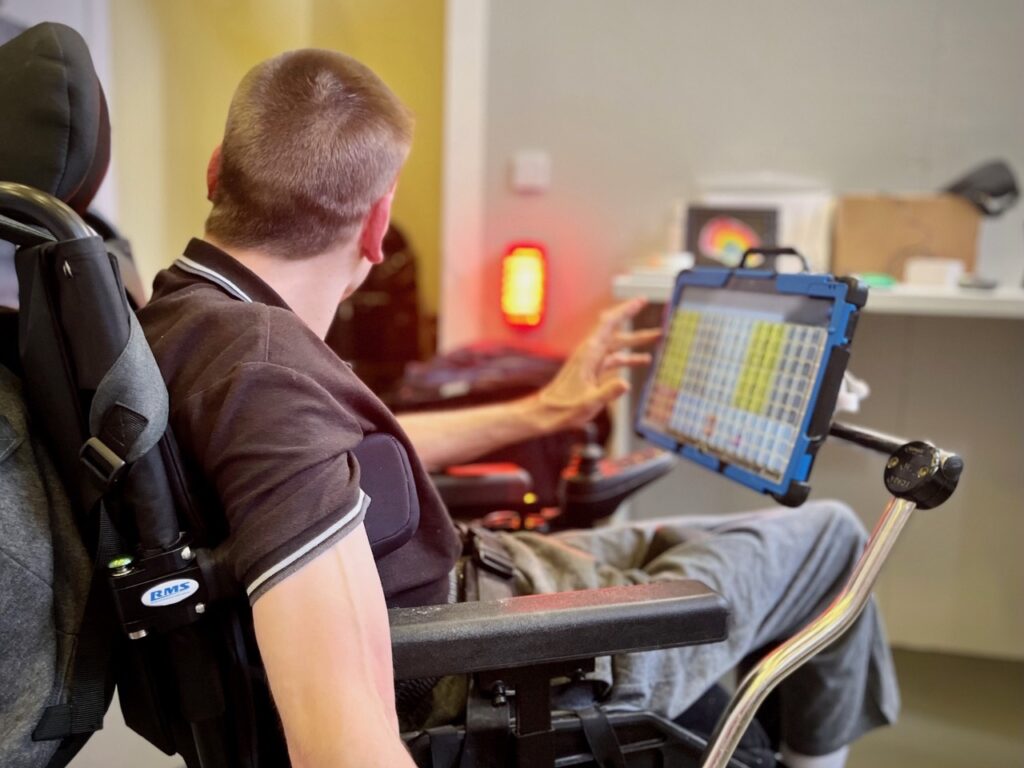A new £28m care facility for residents with complex needs in Perth will use cutting-edge assistive smart technology so they can ‘influence their environment’.
The facility in the city will deploy eye-gaze technology, wireless switches and voice command after the systems were tested in a concept apartment built in a theatre.
Smart home designer Function Control adapted a mock-up apartment that is helping Capability Scotland to deliver sector-leading quality of living for those with complex needs.
The charity recently launched the ‘Our Inclusive Community Project’, which includes ambitious plans for the facility at Bertha Park in the city.
The concept apartment, located within a theatre in its nearby Upper Springland site, is a key element to one of Scotland’s largest ever co-production processes.
Capability Scotland has used the mock-up to assess layout, flow, and access prior to the tech installation.
Hundreds of items of feedback have been received, including from the 60 residents at Upper Springland who would be in line to move to Bertha Park.
It is now undergoing a further phase of co-production that is focused on the use of advanced technology that could revolutionise life for those with a broad range of disabilities, from mobility issues to learning difficulties.
Nick Laing, director of Function Control, said: “Every resident has different needs and requirements, and so it is important that we develop a system that can assist all.
“We have implemented some of the demo technology in the mock-up apartment that allows us to learn from the system and get feedback from those who will be using it.
“Each room in the new facility will be adaptable to the individual. Staff will also be able to track key statistics from each apartment to help the residents, such as the amount of time the resident has spent on their own, room temperature, use of the medical cupboard and if windows or doors have been left open.
“Bertha Park is a pioneering project in assistive technology and will be an exemplar facility within the care sector. We want to be a part of making it a new standard bearer for future developments moving forward.”
The mock-up features lighting and blind control, as well as motorised windows and temperature control. It’s hoped the technology will give residents more influence on their own space while equipping care workers with better resources to carry out their duties.
Other features Function Control intend to implement at Bertha Park include apparatus that will monitor air quality levels and data showing which rooms get used at the facility most frequently in order to maximise the use of space.
Circadian lighting, which is designed to mimic the hours of the day and has been known to positively impact physical and mental health is being considered for the common areas at Bertha Park.
By engaging in co-production, residents and staff have been able to input their ideas and suggestions to Capability Scotland and Function Control. The feedback has allowed the designers to understand how the smallest details can have a big impact.
Naomi Smith, co-production lead at Capability Scotland, said: “The addition of Function Control’s technology demonstrations marks the next exciting step in this ground-breaking project.
“Our ambition is to build the UK’s best enabling and inclusive accommodation for people with severe and complex needs, at the heart of the Bertha Park village community.
“Advanced technology is at the core of making this an exemplar facility to not just live, but work in. We have had a tremendous amount of feedback thus far, and this has helped Function Control produce a technology demo that will cater for all needs.”
Capability Scotland’s Upper Springland site on Isla Road has four registered services and offers residential and respite care to adults with physical and learning disabilities. There is also a day service, as well as a hydrotherapy pool, accessible gym, theatre, and walled gardens.
However, while the quality of care is outstanding, the site is now more than 40-years-old and becoming more difficult to maintain. Climate change also means it faces an increasing flood risk from the River Tay – and the charity wants to create state of the art new flagship services.
